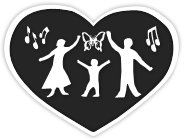How can Music Therapy help with Autism?
Are you a caregiver searching for ways to increase the quality of life of your family member or child coping with autism? You might be asking what tools are there to assist them with learning, growing and expressing their feelings? Look no further – incorporating music therapy can be the solution you have been searching for. I am a board certified music therapist with years of extensive experience working with both children and adults. I have been helping to improve the lives and abilities of individuals with autism by creating a musical, fun, motivating and nurturing atmosphere for them to thrive in.
Music therapists work with families and team members, providing ways to include successful music therapy techniques that support treatment across all disciplines and in other aspects of clients’ lives.
Providing care and support for a loved one in the family who is struggling with autism can be daunting and overwhelming to say the least. For both children and adults suffering from autism, it can mean a life filled with isolating physical, psychological, emotional and neurological conditions.
I currently have some openings for seeing patients with autism and providing the support you need in order to live a fuller life. Please feel free to reach out to me if you or someone you know needs this kind of therapy.
Evidence-Based Approach
Music therapy has shown to assist people with autism by improving their skills in areas such as:
- Communication
- Social Skills
- Sensory Issues
- Behavior
- Cognition
- Perceptual/Motor Skills
- Self-Reliance or Self-Determination
According to the American Music Therapy Association (AMTA), music therapy is a powerful and non-threatening environment for those suffering from autism. The AMTA research further elaborates that:
- Music captures and helps maintain attention
- Music therapy is highly motivating and may be used as a natural “reinforcer” for desired responses
- Music therapy can stimulate individuals to reduce negative responses
- Music increases participation in more appropriate and socially acceptable ways
- Music encourages the attempt of undertaking new tasks
- Music therapy focuses on strengths, which in turn may be utilized to address each individual’s areas of need


